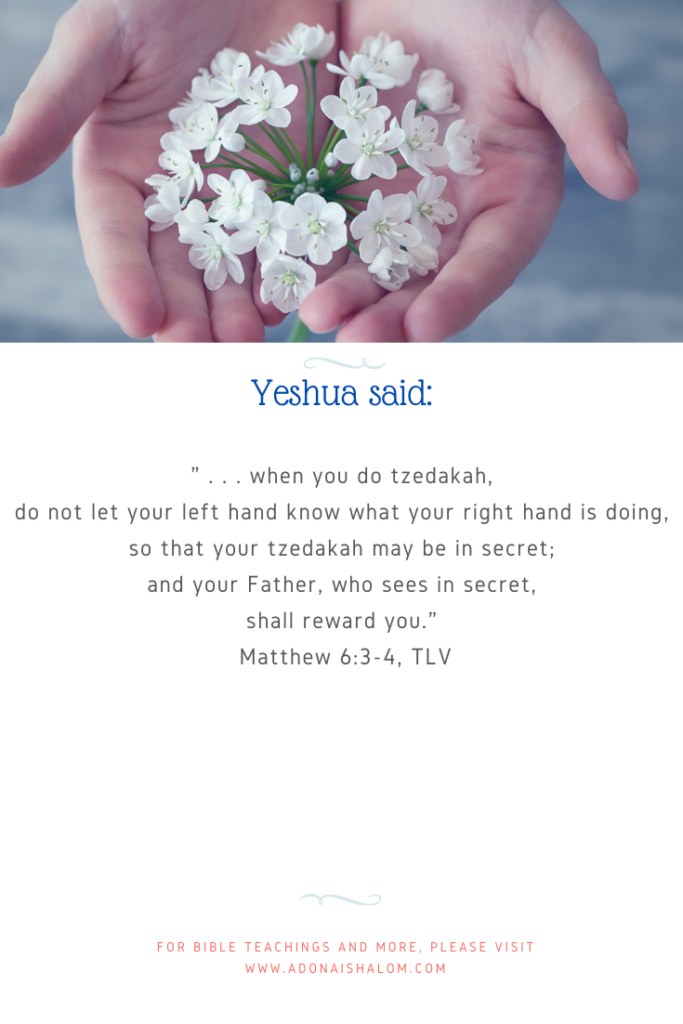
Charitable Giving and Ma’asar Kesafim
To our ears, doing “charitable deeds” or participating in “charitable giving” is like a fancy way of saying doing “good works, or “donating money.” Every year, the IRS will let you deduct some of your good deeds from Caesar’s bill, right? Charitable giving is tracked, graphed, sought-after, solicited, pleaded for, telethoned for . . . and for good reason – there is a healthy motivation when all parties involved win. But how charitable is our charitable giving, if it is done for a reward?
You may know that charitable giving was built into the legal system of ancient Israel. Today, the expectation to practice ma’asar kesafim, or, the giving of 10% of one’s income to the poor is standard tithing and ethical practice in Judaism. Certainly, Torah teaches generosity:
“If there is a poor man among you — any of your brothers within any of your gates in your land that ADONAI your God is giving you — you are not to harden your heart or shut your hand against your poor brother. Rather, you must surely open your hand to him and you must surely lend him enough for his need — whatever he is lacking. Watch yourself, so there is no unworthy thing in your heart saying, ‘The seventh year, the year of cancelling debts, is near,’ and your eye is evil against your poor brother and you give him nothing. Then he may call out to ADONAI against you, and it will be a sin upon you. You must surely give to him, and your heart is not to be grieved when you give to him — for because of this thing ADONAI your God will bless you in all your work and in every undertaking of your hand.
Deuteronomy 15:7-11, TLV, emphases added

The generosity required by the justice of the Almighty does not diminish the giver’s net worth. Paradoxically, the individual who is sincerely generous will prosper and see increase according to Scriptural promises.
Besides help for the needy, tithes and offerings are also intended to support the work of ministry and preparation for the moedim (appointed times/feast days), brought into the house of the LORD. Sadly, many prosperity Gospel organizations have distorted this teaching, pressuring adherents to tithe, not out of love in righteousness, but out of a sense of obligation: warning that if one fails to tithe or does not give enough in offerings, blessings will be withheld or calamity will result. The true Gospel message related to tithing is simple. We are to give back what already belongs to the Most High, both in tithes and offerings, with thankfulness and pure motives.
Tzedek, Tzadik, & Tzedakah: Justice, Righteous(ness) & Charity
It’z not to overwhelm you with highly foreign looking words starting with “tz,” but these are some important Hebrew terms to learn when studying the Scriptures from a Hebraic perspective. Hint: the initial “t” is almost silent and the tz makes the “ts” sound you hear in the word “it’s.”
A “charitable deed” in Hebrew is “tzedakah.” This word is very interesting because it is comprised of the Hebrew alephbet letter tzadi (tzadik) צ which is derived from the term for “righteous” or “righteousness.” A “tzadik” refers to a Righteous person; tzedakah, a righteous deed.
To be “charitable,” then, requires a solid dose of “righteousness,” or else the giving is, as Qoheleth would say, “in vain!” There is none righteous, no, not one (Rom.3:10) – only our Master and Teacher, Messiah Yeshua, the Righteous Branch, Christ our Righteousness. He is the only One worthy of the honorific: “Tzadik.” But precisely because Messiah Jesus died on our behalf and believers are, by faith, clothed in His righteousness, all believers have the opportunity to live in righteousness, not to earn salvation, but to reflect it.
Too many “once saved always saved” sermons have led uninformed believers to mistakingly believe that nothing is required to live into their sanctification. Sanctification is a process, bestowed fully at salvation; but, like the Kingdom, is an “already-not-yet” reality: we are saved and sanctified, but we need the Ruach haKodesh, the Holy Spirit, to continue His sanctifying work in us – a partnership in a sense – between the Almighty and the believer.
Another exercise in etymology will lead you to the discovery that another Hebrew term, “tzedek” means “justice.” True justice cannot exist apart from Incarnate Righteousness. Yeshua has ascended to the Father; we must now embody the virtues of kindness, humility, righteousness, justice; veritably, all of the Fruits of the Spirit! We cannot settle for the world’s misguided attempts at justice or mislabeling of sin as “social justice” precisely because of the world’s blatant defiance and devaluation of all things righteous.
Free righteousness or righteousness-free?
I alluded to this above, but it is truly a travesty that such a large portion of modern-day “Christianity” neglects deep reflection around the topic of righteousness. Yes, we have been given an amazing free gift, the free gift of righteousness as children of God, but too many assemblies, fellowships, and churches have taken a “righteousness-free” posture eliminating discussion of moral righteousness, Godly duty and obligation, and even ethics; preferring political allegiances and cultural norms.
The past year has highlighted this reality. “Conservatives” vs “liberals” on everything from mask-wearing to presidential picks. Most Christians fall into the “conservative” camp, but the label has been tarnished by the unwavering following of leaders who would dismantle the democracy we enjoy. Rather than accept the temporary burden of wearing a mask to protect those around oneself, battle cries waged that freedom was being stolen. Selfishness reigned as the Great Commandment to love your neighbor as yourself was archived along with all the other commandments that a rebellious people are uninterested in keeping.
True Biblical Christianity must be rooted in the fullness of the Hebrew Scriptures. Most Torah scholars would agree that bearing temporary discomfort for the benefit of another is not only a right decision, but the only right decision. Biblical justice involves caring for someone else, regardless of your personal sentiments. Does that other person deserve your compassion? Does that person live by the same standards to which you hold yourself and your family? Perhaps not. But righteousness puts aside one’s own preferences, seeking only to the do the will of the Father, which is to exercise love and share the Good News of salvation. The New Covenant bolsters the concept, exhorting believers to “Be kindly affectionate to one another with brotherly love, in honor giving preference to one another.” (Romans 12:10, NKJV, emphasis added)
Messiah’s instructions in Matthew 6:3-4
Righteousness is demonstrable, yet lest we become “puffed up” as Rabbi Sha’ul would say, our Master Yeshua has words for us:
” . . . when you do a charitable deed, do not let your left hand know what your right hand is doing, that your charitable deed may be in secret; and your Father who sees in secret will Himself reward you openly.” Matthew 6:3-4, NKJV
” . . . when you do tzedakah, do not let your left hand know what your right hand is doing, so that your tzedakah may be in secret; and your Father, who sees in secret, shall reward you.” Matthew/Mattityahu 6:3-4, TLV

Yeshua was addressing an issue in which people were doing their charitable giving with the hope of being seen or recognized in the public sphere for their philanthropy.
The Talmud was influenced by Jesus’ teachings

Midrash teaches: “The deeds of the righteous are always performed expeditiously; no time is lost in undertaking a mitzvah or in its execution.” (Bamidbar Rabbah 10:5; The Wisdom of the Hebrew Alphabet, Rabbi Michael L. Munk) The Talmud, written after Yeshua’s life on earth, arguably draws upon the wisdom He shared with His disciples. In discussion about the Hebrew alephbet, the dalet, written “ד”, can be examined in depth, demonstrating that its origin as “door” also alludes to the alms-seeker who may appear at one’s door. In his book, Rabbi Munk explains, “In a further lesson derived from the shape of the letters, the Talmud notes that the face of the ד is turned to the left, away from the ג, to show that the dal [beggar] should not have to face his gomel [benefactor]. Assistance should be given discreetly and with the greatest tact to preserve the self-respect of the recipient. In the highest form of charity, neither gomel nor dal should be aware of the other’s identity.” (Munk, 80).
When I came upon this fascinating analysis of the alephbet, Rabbi Yeshua’s words immediately came to mind. He said, “don’t let your left hand know what your right hand is doing.” The dalet ד is literally turned toward the left, so that no shame is unnecessarily placed upon the less privileged. Jesus was undeniably concerned for the well-being of the poorest of people, wisely instructing the disciples to conduct their good deeds in secret.
Tzedakah and righteousness are terms missing from the vocabulary of the modern church, but true believers have the opportunity to reclaim them as an awakening to the Hebrew roots of the Bible is occurring globally.
The greatest witness we can make is to live righteously for the healing of the nations.
Did you enjoy this teaching? Please subscribe or *like* us on Facebook to stay connected! Shalom!









1 thought on “Tzedek, Tzadik, & Tzedakah: Matthew 6:3-4 through a Hebraic lens”